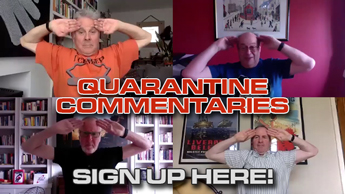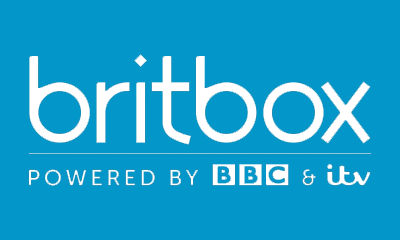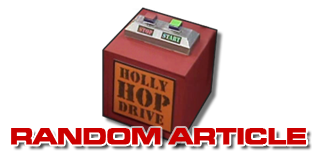 |
On Commission Without the BBC commission, where would Red Dwarf have been? Mr Flibble talks to Peter Ridsdale Scott. |

Andrew Ellard
Mr Fibble, unsure how much fawning is required, first asked Andrew to get some information on Peter's career HISTORY...
My career started in London. I went from university to being a runner at Television Centre. I ran on all kinds of shows, but I knew it was the comedy side that interested me. BBC2 was just starting - that dates me doesn't it! (Laughs) Within six months I was working on Playschool, I ran on it. I submitted a script - the executive producer said, 'All right, if you want to. I'll take you on. Write a script.' So I went to the library and some bookshops, found some stories, strung it together and thought no more about it. I met her about three weeks later and said, 'What did you think?' She said, 'Well, watch the box tomorrow at 11 - see what you think!'

I went from writer to director to producer on Playschool, and other kids' shows. Then an executive producer job came up in Manchester for entertainment, and so I went up there. To cut a long story short, I was changing jobs when Red Dwarf came up - going from executive producer to commissioning editor. It was the beginning of the independent sector, and Manchester, for once, was ahead of the game - we were the region doing the most independent productions.
Paul [Jackson] was doing Happy Families and Filthy Rich and Catflap, and a very canny boss, Hugh Williams, had come in and said, 'This independent sector is going to take off. You and Paul get on - I'm going to make you commissioning editor. You'll have a small budget from me, I want comedy. Take your time, find the scripts, and as long as you feel that's the one, we'll do it.'
I read probably about 200 scripts. I used to go to London once a week, and my secretary would give me five to read on the train, with an envelope to return them. When I got to London, having done the business, I'd go to TV Centre where she'd sent five more - which I read on the train back.
Did Red Dwarf reach you though Paul Jackson?
Paul said, 'I know you're looking for scripts, will you read this?' I said, 'Yeah, I'm going to London tomorrow. Give it to me, I'll read it on the train.' And I laughed on that train. I laughed out loud. People were looking around saying, 'Oh dear, we've got a weirdo here.' But it was so funny that I didn't send it back. I brought it back with me so I could read it again.
While I like sci-fi, I'm not 'into it'. Hitchhikers Guide? Fine - I just don't see it out. If it comes along, I love it, if it doesn't, I'm not bothered. But all this business about being in space on this terrible tramp steamer of a ship seemed attractive to me. This wasn't the glitzy Star Trek-y bit, this was bog-standard people... rather like the train I was sitting on.
I remember taking it into my boss and saying I'd found it. 'Oh, great Peter.' 'Do you want to read it?' 'I'm sure it's fine.' 'Well... can I just describe it? Because I think you'd better know what's coming.' His face was a picture. 'I'm sure it'll be all right. Come and have lunch.' And it wasn't until, literally, we'd made the first one that it was discussed again! I love bosses like that.
I can remember the lines that had me, because they were the Cat lines. I could visualise how that cat-person would be - and I have to say, when it all materialised, Danny John-Jules was exactly it. But the line was, "I've eaten five times, I've slept six times and I've made a lot of things mine. Tomorrow I think I'll try and have sex with something." (Laughs) I don't know cats, but I reckon that's what they're about.

That line wasn't used in the final version of The End, and in fact cropped up in Confidence and Paranoia...
What I read was a script that was two years away from the screen. I would think Rob and Doug asset-stripped that one to rewrite it. You have to hand it to Rob and Doug, my God they worked on that script. Those lines must have been moved to much later. Rob and Doug really did sweat bricks for that series. We had regular meetings, but they worked so hard on the script, the style - and, importantly, the casting.
Mr Flibble felt this was the perfect chance to ask about the lack of penguins in the final Red Dwarf CAST. Especially when, at the time, he was available and willing to work for turbot. Andrew became suddenly deaf in one ear and was unable to pass on this complaint.
We went through hell on the casting to get the balance - crucially Rimmer and Lister. We auditioned loads of names. I remember Alfred Molina's audition, though with names like that it's not an audition, you are 'asking them to read'. We always auditioned in unlikely places. Danny John-Jules got the part in an office in Ealing. Those are the two I remember distinctly. Hugh Laurie a bit, David Baddiel a bit, but Alfred Molina and Danny are the two I remember distinctly.
When he finally arrived - Paul took the call and said, 'Send him up quick!' - he was the guy we had high hopes for. We were looking at this door with a glass panel, and suddenly this apparition appeared in the hall, and with just a beckon from Paul the door burst open and he danced in. He had this dinner suit on - which was a bit too big for him - and he'd got a brooch on. 'A shiny thing.' Then he just stood there... and I think that was it. There was a silence. There could have been a bubble above our heads: 'Let's all go home.' Because that was it. I don't think he even read!
What made you all nearly go for Alfred Molina, and then decide against it?
Alfred read, and it was one of those readings where it was coming good. We were beginning to see how it could work - which is why we were so confident about Alfred Molina. He was right, and he looked right, and he played it right. But we weren't casting as a 'big name' show, because it was patently going to be a team affair. Those first two [roles] had to be of a par, they had to be equivalent, with the Cat as leveller. You couldn't cast high-medium-low, or high-medium-medium. There couldn't be one figure outstanding.
It was the brilliance of casting - not by me, but by Paul, Rob and Doug. We were running out of time, but they were determined to get that balance straight. We knew when we got Craig and Chris that, although you hadn't got almighty names, you had the talent, the skill.
Holly's role changed once Norman was involved, too...
We realised with that first audience recording that we were, particularly with Norman, working to the potential. For the first three episodes, Holly was out of vision. But there was a realisation after the first recording that we were missing a trick here. Why not put the face on the screen? Norman was just wonderful, his style of playing complemented the others.
Mr Flibble mumbled something about the stereotype computer with a human face. What's wrong with flippers and a beak? Andrew realised what a blessing selective deafness can be and carried on regardless. Why was the PILOT episode re-shot so many times?
The first one creaked. It didn't creak in rehearsal, I don't know what it was about it, but maybe it was something about the amalgamation of 'the idea' with the reality. Sets, costumes, whatever. It needed sharpening up. It wasn't on the level we wanted. It didn't quite come off. I can't remember how many times that pilot was re-shot.
The first two series, the money was very tight. Now you can talk to people who've watched it from the beginning who talk about that 'grittiness'. But it worries the professionals, that we cannot achieve that... not gloss, but that feeling of 'ease'. The money we spent on special effects - economy stuff, and Peter Wragg and his crowd did wonders.
The part of Kochanski was recast from Alexandra Pigg to CP Grogan - which actually happened because she wasn't available after the electricians STRIKE. How else did that damage Red Dwarf's chances?

So many things went wrong after that strike. It was like a nightmare. We were in rehearsal when that started. We started the readthrough on Monday, then did the blocking. By Wednesday I knew there was a strike, but I thought it would be over by that weekend. It was only on Friday when I went down for the technical run that I had to take down the news that we weren't going ahead. That was hard, to stand in front of everyone. We'd lived with it for a year. It was a lousy moment.
Of course the cry went up, 'Well, what are we going to do next week?' Keeping morale going, I went, 'No problem at all. But I think we'd better go on to show two. We'll retrieve show one.' Thinking that, if show one creaks, maybe if we shoot it last it won't creak. But the sequence was repeated [five more times].
The rumour was that we wouldn't do it again - we'd spent the money! A million and a quarter had gone. I'd spent the money on the set, on Peter Wragg's special effects models. Costumes had been made, everyone had been paid. You could feel the life drifting away from it.
We did have to alter so much because of people becoming unavailable. One of the other things was whether we were going to get our three main choices back. How long will people wait? You can't wait around while the BBC decides whether to do this series again.
Paul was doing a lot of lobbying. It was a two-pronged attack, with me shouting from within the BBC on Manchester's behalf, and Paul approaching from the outside as an independent producer. I don't know who said it first: 'Insurance'. Surely there was a contingency fund? The sets were in store. There were several meetings held, we worked up a head of steam - and how easy it was to remount! (Laughs)
Finally, what was the BBC REACTION to the finished show?
Every Wednesday, there was a Programme Review Board. You went down to room BO55... and B.O. it was! No air-conditioning, a low ceiling, people were still allowed to smoke... All the heads of department were there. We from the sticks were in attendance, we weren't allowed to sit at the table. (Laughs)

Hugh knew what he was doing. He said, 'I'm not going to be there.' He was a canny lad, and at that moment the jury was still out. It was sufficiently off-centre to excite a lot of internal argument... much of it not complimentary.
I went down on the train, and Paul wasn't going to be there, so I was rehearsing away to myself. But somewhere around Stafford I got fed up with it. The buffet was open and this great big guy lumbered down the corridor with this black T-shirt on. In the haze, I thought, 'There's something written on that... I'm sure there was... Red Dwarf!' So I went to the buffet car, and two up in the queue was this bloke. He'd stencilled 'Dwarf' on in white and 'Red' on in red!
It was such a jolt. After two transmissions! I went back to my seat feeling slightly more optimistic. I resumed with my coffee and opened The Times. It honestly didn't occur to me that they'd have the ratings figures, but I scanned BBC1... then scanned BBC2 next to it. I just let out this big whoop. Red Dwarf was number 2, at 3.8 million, I think it was. We're second?! In the first week?!
I then walked into Programme Review a lot more confident. As I walked in, Roy Thompson said to me, 'By the way - Red Dwarf.' 'Yes?' 'I wish we'd done it.'
Mr Flibble enjoyed talking to Peter Ridsdale Scott, and now that it's over... Mr Flibble is very cross.














